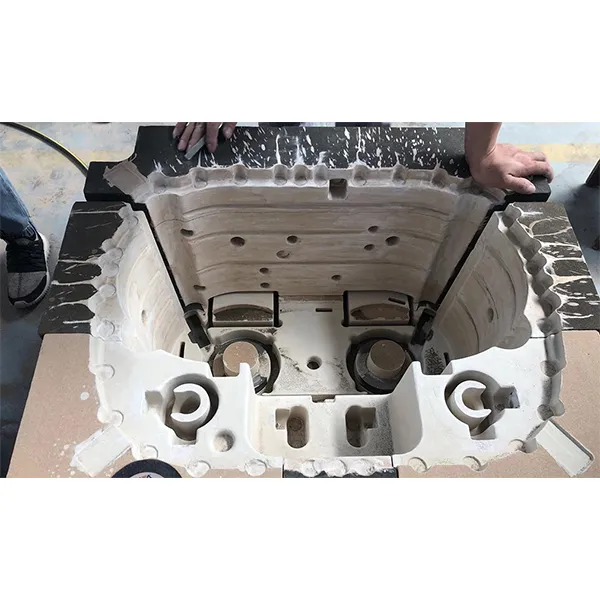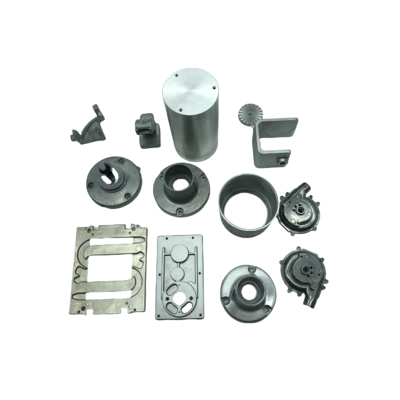Exploring the Duty of Shop Services ahead of time Modern Engineering Solutions
Foundry services are crucial fit modern-day design solutions - Aluminum Foundry. They bridge the gap between typical production techniques and the demands of modern industries. With advancements in automation and sustainability, foundries are progressing to fulfill the needs of sectors such as aerospace and auto. This transformation elevates inquiries regarding the effects for materials, procedures, and future innovations. What chances and challenges lie ahead for factory services in this swiftly changing landscape?
The Evolution of Factory Solutions in Design

The combination of computer-aided style (CAD) and simulation software application has transformed the layout and production processes, enabling shops to produce complex geometries with higher precision. The shift in the direction of environment-friendly techniques has led to the fostering of greener innovations and reusing efforts within factories. As sectors significantly focus on customization and fast prototyping, factory solutions have broadened their abilities, ensuring they continue to be essential factors to the engineering landscape. This advancement underscores the factory's essential duty in sustaining developments throughout numerous fields, including vehicle, aerospace, and energy.
Trick Procedures and Strategies in Modern Foundries
Modern factories utilize a range of essential processes and strategies that boost the performance and quality of steel casting. Amongst these, sand spreading continues to be widespread because of its adaptability and cost-effectiveness. Making use of advanced innovations, such as computer-aided layout (CAD) and computer-aided manufacturing (WEBCAM), enables exact modeling and manufacturing, making sure high precision in component measurements. In addition, financial investment casting is preferred for creating complicated geometries with exceptional surface coatings.
In addition, automation and robotics boost manufacturing rate and uniformity while decreasing labor costs. Strategies like additive production are progressively integrated to produce intricate mold and mildews and cores, consequently lessening material waste. The application of thermal analysis help in enhancing spreading processes by anticipating and regulating solidification habits. Collectively, these processes and methods exhibit exactly how modern-day factories are adjusting to satisfy the needs of modern engineering difficulties, making sure premium product top quality and operational efficiency.
The Value of Materials Choice in Shop Solutions
Choosing the proper materials is important in foundry solutions, as it straight influences the mechanical residential properties, durability, and general performance of the end product. Different materials possess distinct characteristics, such as tensile stamina, rust resistance, and thermal stability, which need to straighten with the designated application of the actors parts. As an example, steels like aluminum and steel are commonly chosen for their strength-to-weight proportion, while alloys can improve specific performance qualities.
The option process includes taking into consideration variables such as manufacturability, availability, and cost, which can notably influence task timelines and spending plans. Furthermore, advancements in product scientific research make it possible for the advancement of innovative compounds and specialized alloys that accommodate arising design obstacles. A detailed understanding of material buildings and their ramifications is crucial for engineers and shop professionals to accomplish successful results in their projects. This mindful selection procedure ultimately improves the reliability and effectiveness of completion items.
Foundry Providers in Aerospace and Automotive Applications
Foundry solutions play a necessary function in the aerospace and vehicle markets, where accuracy and performance are vital. These industries depend heavily on the manufacturing of facility parts that must fulfill strenuous quality requirements and hold up against extreme conditions. Factories supply critical solutions such as spreading, machining, and ending up, ensuring components are lightweight yet durable, crucial for enhancing gas efficiency and safety and security.
In aerospace, foundry services add to the manufacturing of generator blades, engine elements, and architectural parts, every one of which demand complex styles and high-performance materials. Likewise, in the auto sector, foundries provide engine blocks, framework parts, and useful link transmission cases, concentrating on resilience and weight reduction.
Advanced factory methods, including additive manufacturing and accuracy casting, are increasingly employed to satisfy the certain demands of these sectors. By supplying customized remedies, shop services aid drive innovation and keep affordable advantages in the fast-evolving aerospace and auto landscapes.
Innovations Driven by Shop Capabilities
Many innovations in design are fueled by the innovative capacities of factory solutions. These services enable the manufacturing of complicated geometries and high-performance materials that are necessary for modern-day applications. Additive production, commonly recognized as 3D printing, has actually seen considerable developments via shop methods, permitting for the fast prototyping of complex layouts. In addition, the ability This Site to cast light-weight alloys has changed markets such as aerospace and automobile, bring about improved fuel efficiency and efficiency.
Foundries are increasingly integrating wise innovations, such as automation and information analytics, to enhance production efficiency and quality control. These technologies not only reduce waste however additionally enable modification at range, fulfilling the specific needs of clients. By leveraging innovative shop capacities, designers can discover brand-new frontiers in item design and performance, inevitably driving progression across various markets and developing a structure for future innovations.
Future Fads in Factory Providers and Engineering Solutions
The future of foundry services is shaped by emerging patterns such as lasting production methods, which focus on ecological obligation. Automation and clever technologies are readied to boost efficiency and precision, while increasing customization and flexibility will satisfy the progressing needs of clients. As these trends develop, they will redefine the landscape of engineering remedies in the factory industry.
Sustainable Manufacturing Practices
As sectors progressively focus on ecological responsibility, lasting manufacturing techniques within factory services are ending up being necessary to contemporary design options. These techniques concentrate on reducing waste, lowering energy intake, and utilizing environment-friendly products throughout the manufacturing procedure. By executing techniques such as recycling scrap metal and maximizing melting processes, factories can notably lower their carbon footprint. Furthermore, the adoption of life cycle analyses permits suppliers to assess the environmental influence of their products from beginning to disposal. Working together with distributors dedicated to sustainability further imp source boosts the effectiveness of these initiatives. Inevitably, accepting lasting production not only straightens with global environmental goals however also cultivates advancement and competitiveness in the quickly advancing design landscape.
Automation and Smart Technologies
While several industries are embracing technological advancements, shop solutions are experiencing a considerable improvement via automation and clever modern technologies. The integration of robotics and automated systems improves production effectiveness, minimizes human error, and accelerates the manufacturing procedure. Smart innovations, such as IoT and AI, allow real-time monitoring and anticipating upkeep, which enhance functional performance and lessen downtime. These improvements promote data-driven decision-making, allowing shops to react quickly to market demands and improve product quality. Additionally, automation reduces labor prices and improves work environment safety by taking care of hazardous jobs. As shop solutions remain to adopt these developments, they are positioned to redefine design options, resulting in raised competitiveness and sustainability in the manufacturing industry.
Modification and Versatility Patterns
Emerging patterns in shop solutions increasingly stress personalization and versatility to fulfill one-of-a-kind client demands. This change shows a wider need for customized engineering options that adapt to certain task needs and industry standards. Companies are buying advanced technologies, such as additive manufacturing and electronic modeling, allowing them to produce customized parts successfully and cost-effectively. Because of this, factories are moving far from one-size-fits-all techniques, providing customers the capacity to customize layouts and products in real-time. Furthermore, collaboration between design groups and foundry solutions is coming to be a lot more integrated, promoting development and accelerating time-to-market. This pattern not just enhances item performance but also supports sustainability by minimizing waste with specific production procedures.
Regularly Asked Concerns
What Are the Regular Expenses Associated With Foundry Services?
Normal costs connected with foundry solutions include material expenditures, labor costs, tools usage charges, and overhead costs - Aluminum Foundry. These expenses can vary commonly based upon task complexity, volume, and particular demands of the engineering option included
How much time Does the Foundry Refine Usually Take?
The factory process generally takes anywhere from a number of weeks to a couple of months, relying on variables such as intricacy, material requirements, and manufacturing quantity, which can greatly influence timelines and overall job distribution.
What Industries Advantage Most From Factory Solutions?
Industries such as automotive, aerospace, and construction benefit considerably from factory services. These fields depend on precision casting and metal construction to produce complicated elements, boosting product efficiency and functional effectiveness in their respective applications.
What Certifications Should Shops Possess?
Shops must possess accreditations such as ISO 9001 for high quality administration, ISO 14001 for ecological monitoring, and certain sector accreditations like AS9100 for aerospace or IATF 16949 for automobile, guaranteeing compliance and quality guarantee.
Exactly How Do Foundries Make Sure Quality Assurance in Their Procedures?

Shop services are vital in shaping modern design services. As design self-controls have advanced, the duty of shop solutions has changed considerably to satisfy advancing market needs. As sectors progressively focus on customization and fast prototyping, foundry solutions have actually broadened their abilities, guaranteeing they stay necessary contributors to the design landscape. As industries significantly focus on environmental duty, sustainable production techniques within foundry solutions are coming to be necessary to modern design services. In addition, cooperation in between engineering teams and foundry services is ending up being more incorporated, fostering technology and accelerating time-to-market.